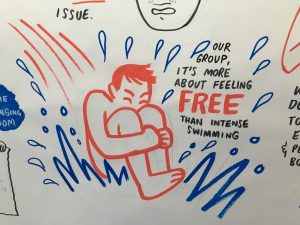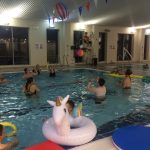As the month of Pride begins, focus group research linked to a British Academy Small Grant project explored the benefits of water-based active leisure for a local transgender group. On Saturday 1st June, at Bournemouth Library in The Triangle, research participants shared their experiences of attending a local swimming pool during privately hired sessions. The cost of the private-hire sessions are covered by the BA Grant and this affords the group exclusive access. Initial findings reveal that such access means group members feel safe, and are able to support each other. Many of the group had stopped swimming and not visited a pool for a long time because of perceived and actual transphobia as well as feelings of fear, and becoming isolated.
The focus group covered topics such as: How important is physical activity to transgender, non-binary and gender non-conforming participants? How have the swimming sessions made you feel about your body? And, do you want the sessions to carry on? A transgender artist attended the focus group and captured the responses via illustrations.
The findings, so far, indicate the positive social and wellbeing aspects of attending the pool sessions. Physical activity was viewed as important in enabling good mental health. Having fun, feeling liberated and free, and being in your own body were common themes. At the same time, feeling unwelcome in public space, and changing room infrastructure presented barriers to active involvement.
During the month of Pride, we cannot forget that statistics indicate LGBTQ+ experience higher levels of anxiety, depression, and suicidal feelings as a consequence of feeling isolated, and experiences of rejection and bullying. Within the community, the figures are higher for transgender people (see: https://www.stonewall.org.uk/sites/default/files/trans_stats.pdf)

If you would like to more about the project please contact: Jayne Caudwell (jcaudwell@bournemouth.ac.uk) and Carly Stewart (cstewart@bournemouth.ac.uk)
 Photo of the week ‘Safe swim: Supporting physical activity and well being for transgender young people’
Photo of the week ‘Safe swim: Supporting physical activity and well being for transgender young people’










 Dr. Ashraf cited on ‘Modest Fashion’ in The Guardian
Dr. Ashraf cited on ‘Modest Fashion’ in The Guardian NIHR-funded research launches website
NIHR-funded research launches website Academics write for newspaper in Nepal
Academics write for newspaper in Nepal New paper published on disability in women & girls
New paper published on disability in women & girls Global Consortium for Public Health Research 2025
Global Consortium for Public Health Research 2025 MSCA Postdoctoral Fellowships 2025 Call
MSCA Postdoctoral Fellowships 2025 Call ERC Advanced Grant 2025 Webinar
ERC Advanced Grant 2025 Webinar Horizon Europe Work Programme 2025 Published
Horizon Europe Work Programme 2025 Published Horizon Europe 2025 Work Programme pre-Published
Horizon Europe 2025 Work Programme pre-Published Update on UKRO services
Update on UKRO services European research project exploring use of ‘virtual twins’ to better manage metabolic associated fatty liver disease
European research project exploring use of ‘virtual twins’ to better manage metabolic associated fatty liver disease